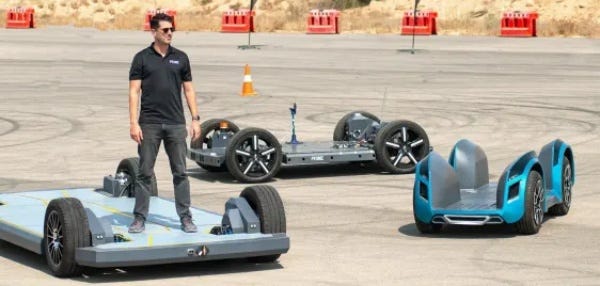Carmakers must die... and flat cars must be their tombstones
The question is, who will issue that decree, and who will execute it?
Some days ago I heard a radio interview to workers and union representatives of a FIAT/Stellantis car manufacturing plant in Italy, that was halting production because it is not convenient anymore. The thing that impressed me the most in the interviews were people declaring that “in Italy we produce too few cars!”, because I was listening while completely stuck in traffic: I had hundred of cars in front of me, behind me and on my sides.

Here’s the trick: the most important part of the paragraph you just read is that I did not write it this month of May 2024, when Stellantis stopped the assembly line of the electric FIAT 500 in Turin. I wrote it almost fifteen years ago, when FIAT, its workers and their unions were playing exactly the same script about the stop of another FIAT plant, in Termini Imerese. As in, we really haven't learned anything in fifteen years.
But maybe now we are to the point where there is nothing to learn, just an already well established reality to see. We need to see what comes after the car and who will do it, because the car as a mass phenomenon is already dying, for all the reasons I wrote here, and all these that came later:
High borrowing costs are eroding Americans' appetite for big pickups
The enormity of many cars, not just American ones, also is a "desire to wall oneself off from the world, to float above degraded infrastructure and the threat of violence even as one contributes to both". That is, a mental and social health issue to solve as soon as possible
Signals that we already are in the "early days of decrossoverification" and that the "End of Private Cars" has already begun even in American cities keep coming
More people want what the Dutch already have : "streets that everyone, from the youngest children to the most elderly adults, would feel safe using."
More and more people will drive their current cars till they fall apart, not because doing so does save a LOT of money, but simply because they cannot afford otherwise.
For many others, their first electric car may be just the gas-powered one they are driving now
Smart cars are still so dumb that they may cost you hundreds of dollars just for something as stupid as fuses for talking to satellites that shouldn't even exist (1)
Driverless will never be really driverless (not soon enough to matter for those who would really want to make or use driverless cars now, at least): not if, as we can learn from the NHTSA investigation, the Waymo company with "an overwhelming lead in making autonomous cars that work", is the same Waymo company that is "not even close" to dealing with road construction and road emergency situations
Even bigger fantasies like air taxis remain luckily unviable, because if they did become real, they would just move traffic jams up in the air (me, 2018) (2)
Ford is "shifting its strategy for EVs as demand wanes". The 2024 New York International Auto Show was unimaginable even a few years ago: "no Chrysler, Dodge, Ram, Fiat, Alfa Romeo, or Maserati...[almost no] German manufacturers".

What next, then?
I said this years ago, and I'll repeat it now: I fail to see how carmaker stocks can still be considered a long- or even medium term good investment. The mass car of 2024 is just another culture that "rose to the top of their arcs of progress… Only to experience a fall and a subsequent dark age thereafter. And most ironically... developed their most sophisticated technologies right before their demise" (source).

What comes after the cars of today may not even be cars. If you ask me, if cars for mass private transits weren’t dying period, personal hovercrafts would be a cool, real life version of Luke Skywalker's landspeeder, that would be perfect in the real towns of our real world that are already reducing paved infrastructures. On a more realistic level, the vehicles that are powering an EV revolution in India, and generally electrifying faster than basically any other type are not cars, but highly effective rickshaws. An even bigger, even cheaper and easier revolution may be subsidized PRIVATE scooters.
But sticking to cars... The engine type doesn't matter. A mass car industry can exist only if car remains a mass product. In a world where population keeps concentrating in cities, rural residents may certainly still need and keep huge SUVs or pickups, but they would very likely have to build them by themselves, Mad Max style, or pay them as much as a house.
The only "mass" cars that can survive are cars that will bury all current car makers. First, simply because of cost and lack of space, there will be too few, mostly shared cars where most people are going to live (cities) to keep Car Business As Usual profitable. Second, because those cars will have to be beyond the capability of most current carmakers to adapt.
We have billions of battery-operated devices of all sort because their batteries, being small, fungible commodities that only exist in a few tens of fully standardized models, can go inside any device made for them, and even be moved from device to device, anywhere in the world. To survive, cars must become like those batteries.
Imagine a "car" that is only a flat platform you can plug "inside", that is below, any car body you ordered separately, including ones you may rent for special occasions, e.g. going to a fancy wedding.
Imagine a car like that, much simpler, much cheaper because it's much more modular, based on few standardized frames shipped in flat packages like Ikea furniture.

Imagine such a car coupled with laws that make its repair by any independent technician really easy and affordable for decades, with open protocols that directly connect buyers and sellers of spare parts.
Such real innovation is the only way for cars to survive, and at some point it WILL happen simply, if nothing else because all the alternatives are already withering away. To make it happen in the least traumatic way possible though, two things are necessary, starting yesterday:
Lots of future-, not market-oriented regulation and standardization
Super-optimized manufacturing and distribution
The only organization that has both enough influence and is not close, but less distant than any other to the right mindset to make the first point start now is the European Union. The EU just loves to regulate, and this is its real, not perfect but usually beneficial soft power. The only organization that can do the second point soon enough is China. Assuming it’s not already doing just that, of course. Says here, about a Chinese car that sells around $12,000 in China, with craftsmanship comparable to vehicles that cost three times as much:
Any car company that’s not paying attention to BYD as a competitor is going to be lost when they hit their market
"Chinese EVs are so good that without trade barriers, they will pretty much demolish most other car companies in the world”
Summing up, the solution, or more exactly the only unavoidable future for a car industry that is also sustainable, whatever you mean by sustainable, looks a lot like managed "rightsizing" by EU-driven regulation of Chinese production of EV, or at least hybrid cars. A hugely difficult task, yes. Wars have happened for much less. But if the EU and China were smart enough to partner on this... Wow!
At the personal level, this means that, wherever you live, your last car will very likely be Chinese but..
Does it really matter, since your next car will likely be your LAST car anyway? Would that be really bad? For whom? If there is one thing we know for sure, is that no matter how the car industry evolves, most of its current employees won't make it to retirement anyway. Their personal livelihood must be guaranteed, but that is a separate problem that would exist and be urgent even if nothing described here happened.
As far drivers and consumers are concerned, a car is just a tool like a screwdriver, not one's dignity. What would be wrong if everybody who needs a car got even better solutions, or a car so good that "pretty much demolishes most other car companies in the world" and lasts at least 25 years, in a world that doesn't make him or her want to wall themselves off?
Usual final call: the more direct support I get, the more I can investigate and share content like this with everybody who could and should know it. If you can’t or don’t want to do it with a paid subscription, you may fund me directly via via PayPal (mfioretti@nexaima.net), LiberaPay, or in any of the other ways listed here.





